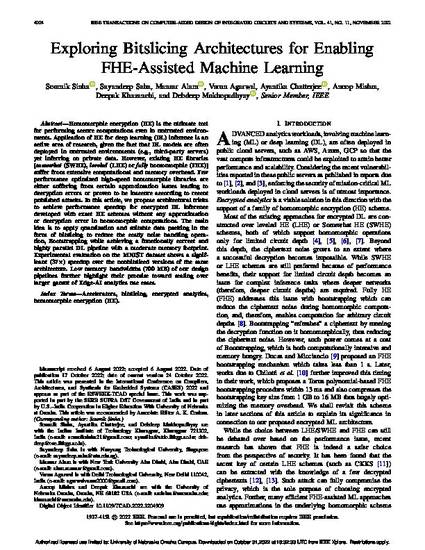
Article
Exploring Bitslicing Architectures for Enabling FHE-Assisted Machine Learning
IEEE TRANSACTIONS ON COMPUTER-AIDED DESIGN OF INTEGRATED CIRCUITS AND SYSTEMS
(2022)
Abstract
Homomorphic encryption (HE) is the ultimate tool
for performing secure computations even in untrusted environments.
Application of HE for deep learning (DL) inference is an
active area of research, given the fact that DL models are often
deployed in untrusted environments (e.g., third-party servers)
yet inferring on private data. However, existing HE libraries
[somewhat (SWHE), leveled (LHE) or fully homomorphic (FHE)]
suffer from extensive computational and memory overhead. Few
performance optimized high-speed homomorphic libraries are
either suffering from certain approximation issues leading to
decryption errors or proven to be insecure according to recent
published attacks. In this article, we propose architectural tricks
to achieve performance speedup for encrypted DL inference
developed with exact HE schemes without any approximation
or decryption error in homomorphic computations. The main
idea is to apply quantization and suitable data packing in the
form of bitslicing to reduce the costly noise handling operation,
Bootstrapping while achieving a functionally correct and
highly parallel DL pipeline with a moderate memory footprint.
Experimental evaluation on the MNIST dataset shows a significant
(37×) speedup over the nonbitsliced versions of the same
architecture. Low memory bandwidths (700 MB) of our design
pipelines further highlight their promise toward scaling over
larger gamut of Edge-AI analytics use cases.
Disciplines
Publication Date
November, 2022
Citation Information
Deepak Khazanchi. "Exploring Bitslicing Architectures for Enabling FHE-Assisted Machine Learning" IEEE TRANSACTIONS ON COMPUTER-AIDED DESIGN OF INTEGRATED CIRCUITS AND SYSTEMS Vol. 41 Iss. 11 (2022) p. 4004 - 4015 Available at: http://works.bepress.com/khazanchi/104/
